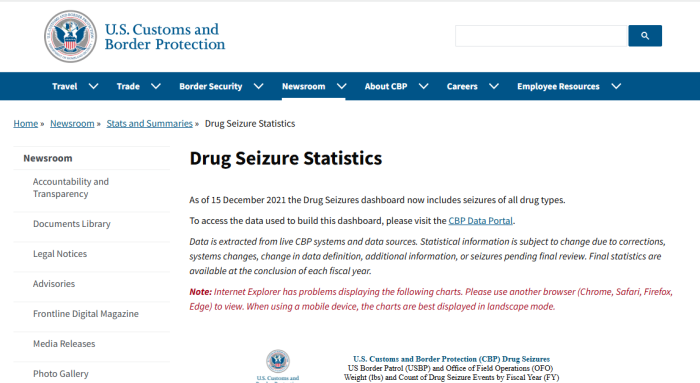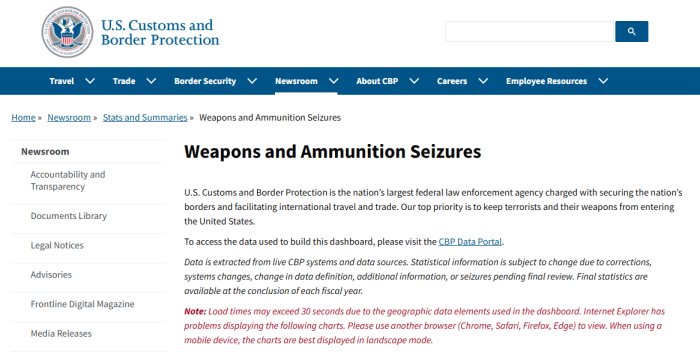
This article will focus on data from the U.S. Customs and Border Protection, or USCBP. It sheds light on just how bad things are with their borders, particularly the side with Mexico. There have been many interests vested in not securing it. Consequently, people flood in illegally, since there’s little reason not to at least try.
Why should Canadians care about this?
The answer is simple: it’s not just an American problem. Open borders threatens nations in general. Not only that, many of those illegal aliens will surely be working their way to Canada, given the generous welfare benefits available.
There’s also some historical data, going back 100 years on total apprehensions.
The following data is by no means all of the information that CBP releases, including on weapons and drugs. It’s just a portion of it. But it should be alarming to anyone who takes border security seriously.
Total Customs And Border Patrol Enforcement Actions
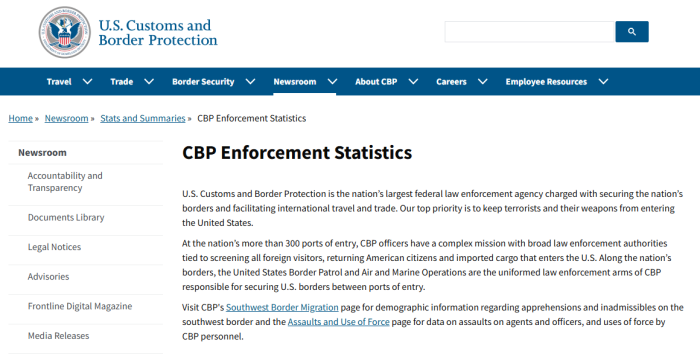
| YEAR | TOTALS | OFFICE OF FIELD OPS | US BORDER PATROL |
|---|---|---|---|
| FY 2017 | 526,901 | 216,370 | 310,531 |
| FY 2018 | 683,178 | 281,881 | 404,142 |
| FY 2019 | 1,148,024 | 288,523 | 859,501 |
| FY 2020 | 646,822 | 241,786 | 405,036 |
| FY 2021 | 1,956,519 | 294,352 | 1,662,167 |
| FY 2022 | 2,766,582 | 551,930 | 2,214,652 |
| FY 2023 | 3,201,144 | 1,137,452 | 2,063,692 |
| FY 2024* | 1,981,177 | 809,460 | 1,171,717 |
* Beginning in March FY20, OFO Encounters statistics include both Title 8 Inadmissibles and Title 42 Expulsions. To learn more, visit Title-8-and-Title-42-Statistics. Inadmissibles refers to individuals encountered at ports of entry who are seeking lawful admission into the United States but are determined to be inadmissible, individuals presenting themselves to seek humanitarian protection under our laws, and individuals who withdraw an application for admission and return to their countries of origin within a short timeframe.
** Beginning in March FY20, USBP Encounters statistics include both Title 8 Apprehensions and Title 42 Expulsions. To learn more, visit Title-8-and-Title-42-Statistics. Apprehensions refers to the physical control or temporary detainment of a person who is not lawfully in the U.S. which may or may not result in an arrest.
Inadmissible Foreign Criminals And Outstanding Warrants

| YEAR | OFO C.N.E | NCIC** | USBP C.N.E | USBP Warrants | |||||||||
|---|---|---|---|---|---|---|---|---|---|---|---|---|---|
| FY 2017 | 10,596 | 7,656 | 8,531 | 2,675 | |||||||||
| FY 2018 | 11,623 | 5,929 | 6,698 | 1,550 | |||||||||
| FY 2019 | 12,705 | 8,546 | 4,269 | 4,153 | |||||||||
| FY 2020 | 7,009 | 7,108 | 2,438 | 2,054 | |||||||||
| FY 2021 | 6,567 | 8,979 | 10,763 | 1,904 | |||||||||
| FY 2022 | 16,993 | 10,389 | 15,267 | 949 | |||||||||
| FY 2023 | 20,166 | 11,509 | 15,267 | 988 | |||||||||
| FY 2024*** | 11,626 | 6,946 | 10,337 | 587 |
| YEAR | OC | NO | DE | JA | FE | MA | AP | MY | JN | JL | AU | SE | TOT |
|---|---|---|---|---|---|---|---|---|---|---|---|---|---|
| 2021 | 98K | 67K | 69K | 60K | 90K | 88K | 64K | 89K | 93K | 77K | 75 | 45 | 913K |
| 2022 | 83K | 58K | 45K | 50K | 60K | 44K | 53K | 47K | 61K | 54K | 60K | 41K | 656K |
| 2023 | 37K | 39K | 40K | 49K | 70K | 56K | 36K | 41K | 44K | 50K | 49K | 39K | 549K |
| 2024* | 37K | 48K | 34K | 37K | 67K | 51K | 46K | – | – | – | – | – | 321K |
* FY 2024, or Fiscal Year 2024, ends on September 30th, 2024
Data represents pounds that were seized, rounded for space considerations. For example, 58K means 58,000 pounds of narcotics.
Source: https://www.cbp.gov/newsroom/stats/drug-seizure-statistics
Types Of Drugs Seized 2021-2024
| YEAR | MJ | ME | CO | FE | HE | KH | KE | EC | LSD | OTH |
|---|---|---|---|---|---|---|---|---|---|---|
| 2021 | 319K | 192K | 98K | 11K | 5K | 203K | 22K | 1K | 38 | 73K |
| 2022 | 155K | 175K | 70K | 15K | 2K | 175K | 14K | 1K | 36 | 49K |
| 2023 | 150K | 140K | 81K | 27K | 2K | 70K | 8K | 649 | 11 | 71K |
| 2024* | 110K | 105K | 41K | 11K | 513 | 5K | 9K | 321 | 6 | 39K |
MJ = Marijuana
ME = Methamphetamine
CO = Cocaine
FE = Fentanyl
HE = Heroin
KH = Khat (Catha Edulis)
EC = Ecstasy
LSD = LSD
OTH = Other Drugs
Source: https://www.cbp.gov/newsroom/stats/drug-seizure-statistics
* FY 2024, or Fiscal Year 2024, ends on September 30th, 2024
Weapons And Firearms Seized
| YEAR | AM | CA | MA | OG | RE | SC | SI | BA | TOTAL |
|---|---|---|---|---|---|---|---|---|---|
| FY 2021 | 345,757 | – | 419 | 230,761 | 181 | – | 18,036 | – | 595,154 |
| FY 2022 | 1,029,554 | – | 516 | 115,902 | 253 | – | 1,272 | – | 1,147,497 |
| FY 2023 | 501,368 | 847 | 7,532 | 34,181 | 324 | 357 | 2,457 | 544 | 547,610 |
| FY 2024* | 243,783 | 178 | 6,475 | 47,719 | 175 | 238 | 1,907 | 3,282 | 303,756 |
AM = Ammunition
CA = Case
MA = Magazine
OG = Other Gun Parts
RE = Receiver
SC = Scope
SI = Silencer/Muffler
BA = Vest/Body Armour
* FY 2024, or Fiscal Year 2024, ends on September 30th, 2024
Source: https://www.cbp.gov/newsroom/stats/weapons-and-ammunition-seizures
Terrorist Screening Encounters
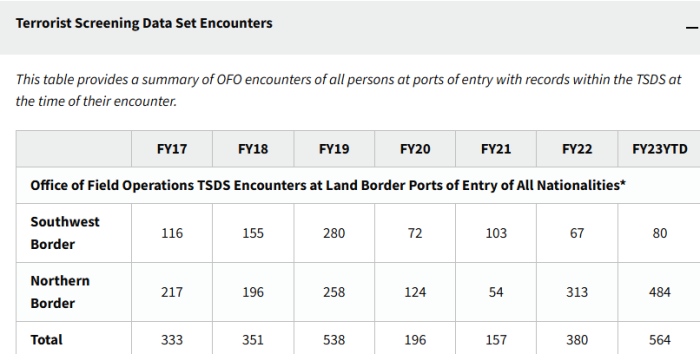
| YEAR | SOUTHERN BORDER | NORTHERN BORDER | TOTAL |
|---|---|---|---|
| FY 2017 | 116 | 217 | 333 |
| FY 2018 | 155 | 196 | 351 |
| FY 2019 | 280 | 258 | 538 |
| FY 2020 | 72 | 124 | 196 |
| FY 2021 | 103 | 54 | 157 |
| FY 2022 | 67 | 313 | 380 |
| FY 2023 | 80 | 484 | 564 |
| FY 2024* | 24 | 172 | 196 |
| YEAR | SOUTHERN BORDER | NORTHERN BORDER | TOTAL |
|---|---|---|---|
| FY 2017 | 2 | 0 | 2 |
| FY 2018 | 6 | 0 | 6 |
| FY 2019 | 0 | 3 | 3 |
| FY 2020 | 3 | 0 | 3 |
| FY 2021 | 15 | 1 | 16 |
| FY 2022 | 98 | 0 | 98 |
| FY 2023 | 169 | 3 | 172 |
| FY 2024* | 80 | 1 | 81 |
* FY 2024, or Fiscal Year 2024, ends on September 30th, 2024
Source: https://www.cbp.gov/newsroom/stats/cbp-enforcement-statistics
Arrests Of Non-Citizen Gang Members
| YEAR | 18TH ST. | MS-13 | PAISAS | OTHER | TOTAL |
|---|---|---|---|---|---|
| FY 2015 | 84 | 335 | 73 | 352 | 844 |
| FY 2016 | 47 | 253 | 119 | 283 | 702 |
| FY 2017 | 61 | 228 | 53 | 194 | 536 |
| FY 2018 | 145 | 413 | 62 | 188 | 808 |
| FY 2019 | 168 | 464 | 90 | 254 | 976 |
| FY 2020 | 36 | 72 | 93 | 162 | 363 |
| FY 2021 | 28 | 113 | 79 | 128 | 348 |
Source: https://www.cbp.gov/newsroom/stats/cbp-enforcement-statistics-fy2023
Note: More recent data breaks down data among many other gangs. However, most have had just a few members detained at the border.
Arrests of Non-Citizens with Criminal Convictions
| FISCAL YEAR | TOTAL ARRESTS |
|---|---|
| FY 2017 | 8,531 |
| FY 2018 | 6,698 |
| FY 2019 | 4,269 |
| FY 2020 | 2,438 |
| FY 2021 | 10,763 |
| FY 2022 | 12,028 |
| FY 2023 | 15,267 |
| FY 2024* | 10,337 |
* FY 2024 ends on September 30th, 2024
Source: https://www.cbp.gov/newsroom/stats/cbp-enforcement-statistics/criminal-noncitizen-statistics
Records checks of available law enforcement databases following the apprehension of an individual may reveal a history of criminal conviction(s). That conviction information is recorded in a U.S. Customs and Border Protection database, from which the data below is derived.
Total Criminal Convictions by Type Of Non-Citizens
| YEAR | ABSV | ROB | DUI | HOM | DRUG | IRE | WEAP | SEX | OTH |
|---|---|---|---|---|---|---|---|---|---|
| FY 2017 | 692 | 595 | 1,596 | 3 | 1,249 | 4,502 | 173 | 137 | 1,851 |
| FY 2018 | 524 | 347 | 1,113 | 3 | 871 | 3,920 | 106 | 80 | 1,364 |
| FY 2019 | 299 | 184 | 614 | 2 | 449 | 2,663 | 66 | 58 | 814 |
| FY 2020 | 208 | 143 | 364 | 3 | 386 | 1,261 | 49 | 156 | 580 |
| FY 2021 | 1,178 | 825 | 1,629 | 60 | 2,138 | 6,160 | 336 | 488 | 2,691 |
| Fy 2022 | 1,142 | 896 | 1,614 | 62 | 2,239 | 6,797 | 309 | 365 | 2,891 |
| FY 2023 | 1,254 | 864 | 2,493 | 29 | 2,055 | 8,790 | 307 | 284 | 3,286 |
| FY 2024* | 662 | 412 | 1,778 | 20 | 942 | 6,368 | 142 | 133 | 1,933 |
* Fiscal Year 2024 runs October 1, 2023- September 30, 2024.
Source: https://www.cbp.gov/newsroom/stats/cbp-enforcement-statistics/criminal-noncitizen-statistics
The FY total displays the total CES apprehensions but does not equal the sum of data by category because the same apprehension can have multiple NCIC Charges that are included in multiple categories.
“Other” includes any conviction not included in the categories above.
ABSV = Assault, Battery, Domestic Violence
ROB = Burglary, Robbery, Larceny, Theft, Fraud
DUI = Driving Under The Influence
HOM = Homicide: Murder, Manslaughter, etc….
DRUG = Illegal Drug Possession, Trafficking
IRE = Illegal Re-Entry
WEAP = Illegal Weapons Possession, Transport, Trafficking
SEX = Sexual Offences
OTH = Categories Not Listed Above
Historical Data On Apprehensions: 1925 – 2020
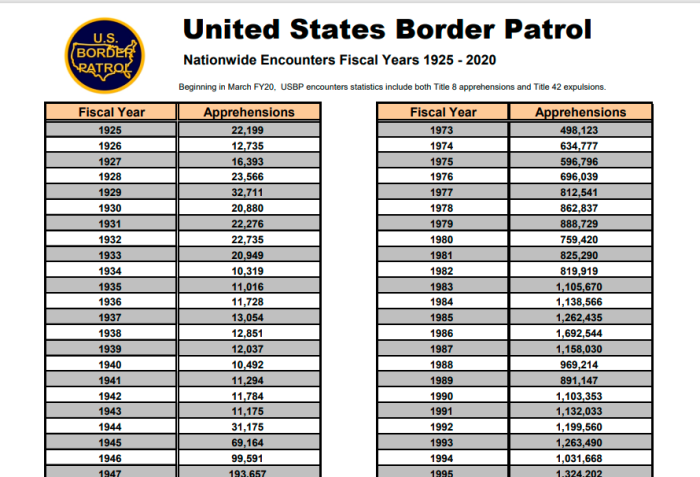
| YEAR | TOTAL | YEAR | TOTAL | YEAR | TOTAL |
|---|---|---|---|---|---|
| 1925 | 22,199 | 1926 | 12,735 | 1927 | 16,393 |
| 1928 | 23,566 | 1929 | 32,711 | 1930 | 20,880 |
| 1931 | 22,276 | 1932 | 22,735 | 1933 | 20,949 |
| 1934 | 10,319 | 1935 | 11,016 | 1936 | 11,728 |
| 1937 | 13,054 | 1938 | 12,851 | 1939 | 12,037 |
| 1940 | 10,492 | 1941 | 11,294 | 1942 | 11,784 |
| 1943 | 11,175 | 1944 | 31,175 | 1945 | 69,164 |
| 1946 | 99,591 | 1947 | 193,657 | 1948 | 192,779 |
| 1949 | 288,253 | 1950 | 468,339 | 1951 | 509,040 |
| 1952 | 528,815 | 1953 | 835,311 | 1954 | 1,028,246 |
| 1955 | 225,186 | 1956 | 68,420 | 1957 | 46,225 |
| 1958 | 40,504 | 1959 | 32,996 | 1960 | 28,966 |
| 1961 | 29,384 | 1962 | 29,897 | 1963 | 38,861 |
| 1964 | 42,879 | 1965 | 52,422 | 1966 | 79,610 |
| 1967 | 94,778 | 1968 | 123,519 | 1969 | 172,391 |
| 1970 | 231,116 | 1971 | 302,517 | 1972 | 396,495 |
| 1973 | 498,123 | 1974 | 634,777 | 1975 | 596,796 |
| 1976 | 696,039 | 1977 | 812,541 | 1978 | 862,837 |
| 1979 | 888,729 | 1980 | 759,420 | 1981 | 825,290 |
| 1982 | 819,919 | 1983 | 1,105,670 | 1984 | 1,138,566 |
| 1985 | 1,262,435 | 1986 | 1,692,544 | 1987 | 1,158,030 |
| 1988 | 969,214 | 1989 | 891,147 | 1990 | 1,103,354 |
| 1991 | 1,132,033 | 1992 | 1,199,560 | 1993 | 1,263,490 |
| 1994 | 1,031,668 | 1995 | 1,324,202 | 1996 | 1,549,876 |
| 1997 | 1,412,953 | 1998 | 1,555,776 | 1999 | 1,579,010 |
| 2000 | 1,676,438 | 2001 | 1,266,214 | 2002 | 955,310 |
| 2003 | 931,557 | 2004 | 1,160,395 | 2005 | 1,189,075 |
| 2006 | 1,089,092 | 2007 | 876,704 | 2008 | 723,825 |
| 2009 | 556,041 | 2010 | 463,382 | 2011 | 340,252 |
| 2012 | 364,768 | 2013 | 420,789 | 2014 | 486,651 |
| 2015 | 337,117 | 2016 | 415,816 | 2017 | 310,531 |
| 2018 | 414,142 | 2019 | 859,501 | 2020 | 405,036 |
* FY 2020 ended on September 30th, 2020
Source: https://www.cbp.gov/newsroom/media-resources/stats (pdf file) (archive)
Again, this is nowhere near all the information that the CBP puts out. It’s just a snapshot of the people, drugs, weapons and more that have been stopped. It’s alarming to think how many people, drugs and weapons aren’t being caught.
(1) https://www.cbp.gov/
(2) https://www.cbp.gov/newsroom/stats/cbp-enforcement-statistics
(3) https://www.cbp.gov/newsroom/stats/drug-seizure-statistics
(4) https://www.cbp.gov/newsroom/stats/weapons-and-ammunition-seizures
(5) https://www.cbp.gov/newsroom/stats/southwest-land-border-encounters
(6) https://www.cbp.gov/newsroom/stats/cbp-enforcement-statistics/criminal-noncitizen-statistics
(7) https://www.cbp.gov/newsroom/media-resources/stats
(8) U.S. Border Patrol Total Apprehensions (FY 1925 – FY 2020) (508)
Illegal Crossings Into Canada For 2023: Quebec Way Down, B.C. Rising
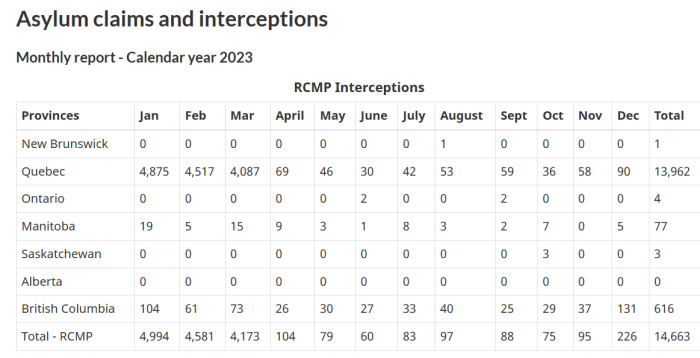
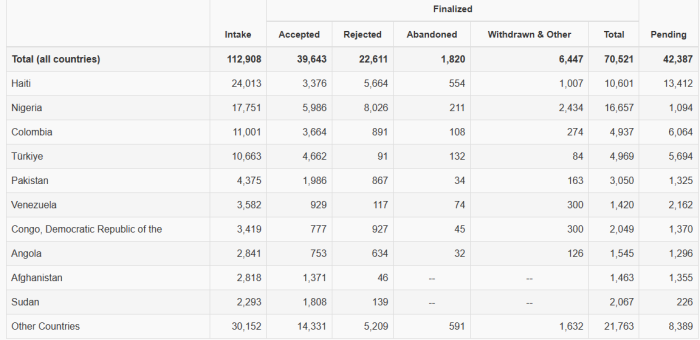
In the first few months of 2023, there were over 4,000 people crossing into Canada illegally. But after changes were announced to apply the Safe Third Country Agreement to the entire Canada/U.S. border, it dropped to an average of about 100.
This of course confirms what many had said all along: the Government could have stopped people from entering illegally at any time if it wanted to. However, politicians simply pretended to be helpless to stop this from happening.
Since January 2017, there have been almost 113,000 illegal crossings into Canada from the U.S. The top 5 source countries have been:
(a) Haiti
(b) Nigeria
(c) Columbia
(d) Turkey
(e) Pakistan
Of course, there is a major disclaimer. This data only are what’s being reported, and doesn’t include anyone who’s slipped across the border unnoticed. The numbers could always be — and likely is — much higher than this.
| PROVINCE/TERRITORY | 2011 | 2012 | 2013 | 2014 | 2015 | 2016 |
|---|---|---|---|---|---|---|
| Newfoundland | 0 | 0 | 0 | 0 | 0 | 0 |
| Prince Edward Island | 0 | 0 | 0 | 0 | 0 | 0 |
| Nova Scotia | 0 | 0 | 0 | 0 | 0 | 0 |
| New Brunswick | 10 | 5 | 5 | ? | ? | 25 |
| Quebec | 1,335 | 1,295 | 785 | 875 | 1,035 | 2,595 |
| Ontario | 2,660 | 2,340 | 1,995 | 2,630 | 2,790 | 3,7935 |
| Manitoba | 20 | 15 | 25 | 10 | 225 | 505 |
| Saskatchewan | ? | ? | ? | ? | ? | 30 |
| Alberta | 35 | 40 | 35 | 65 | 70 | 120 |
| British Columbia | 125 | 85 | 110 | 130 | 170 | 220 |
| Yukon | 0 | 0 | 0 | 0 | 0 | 5 |
| Northwest Territories | 0 | 0 | 0 | 0 | 0 | 0 |
| Nunavut | 0 | 0 | 0 | 0 | 0 | 0 |
| TOTALS | 4,185 | 3,770 | 2,955 | 3,715 | 4,290 | 7,365 |
Illegals were still coming into Canada via land border crossings during the Harper years. Interestingly though, it only receives major attention when Liberals are in power. A cynic may wonder why.
| YEAR: 2017 | |||||
|---|---|---|---|---|---|
| MONTH | QUEBEC | MANITOBA | B.C. | OTHERS | TOTAL |
| January | 245 | 19 | 46 | 5 | 315 |
| February | 452 | 142 | 84 | 0 | 678 |
| March | 654 | 170 | 71 | 2 | 897 |
| April | 672 | 146 | 32 | 9 | 859 |
| May | 576 | 106 | 60 | 0 | 742 |
| June | 781 | 63 | 39 | 1 | 884 |
| July | 2,996 | 87 | 51 | 0 | 3,314 |
| August | 5,530 | 80 | 102 | 0 | 5,712 |
| September | 1,720 | 78 | 79 | 4 | 1,881 |
| October | 1,755 | 67 | 68 | 8 | 1,890 |
| November | 1,539 | 38 | 46 | 0 | 1,623 |
| December | 1,916 | 22 | 40 | 0 | 1,978 |
| TOTAL | 18,836 | 1,018 | 718 | 22 | 20,593 |
| YEAR: 2018 | |||||
|---|---|---|---|---|---|
| MONTH | QUEBEC | MANITOBA | B.C. | OTHERS | TOTAL |
| January | 1,458 | 18 | 41 | 0 | 1,517 |
| February | 1,486 | 31 | 48 | 0 | 1,565 |
| March | 1,884 | 53 | 33 | 0 | 1,970 |
| April | 2,479 | 50 | 31 | 0 | 2,560 |
| May | 1,775 | 36 | 53 | 0 | 1,869 |
| June | 1,179 | 31 | 53 | 0 | 1,263 |
| July | 1,552 | 51 | 31 | 0 | 1,634 |
| August | 1,666 | 39 | 39 | 3 | 1,747 |
| September | 1,485 | 44 | 68 | 4 | 1,601 |
| October | 1,334 | 23 | 37 | 0 | 1,394 |
| November | 978 | 23 | 18 | 0 | 1,019 |
| December | 1,242 | 11 | 27 | 0 | 1,280 |
| TOTAL | 18,518 | 410 | 479 | 7 | 19,419 |
| YEAR: 2019 | |||||
|---|---|---|---|---|---|
| MONTH | QUEBEC | MANITOBA | B.C. | OTHERS | TOTAL |
| January | 871 | 1 | 16 | 1 | 888 |
| February | 800 | 1 | 6 | 2 | 808 |
| March | 967 | 13 | 22 | 0 | 1,002 |
| April | 1,206 | 15 | 25 | 0 | 1,246 |
| May | 1,149 | 27 | 20 | 0 | 1,196 |
| June | 1,536 | 26 | 5 | 0 | 1,567 |
| July | 1,835 | 23 | 15 | 1 | 1,874 |
| August | 1,712 | 26 | 22 | 2 | 1,762 |
| September | 1,706 | 19 | 17 | 0 | 1,737 |
| October | 1,595 | 18 | 8 | 1 | 1,622 |
| November | 1,118 | 9 | 21 | 0 | 1,148 |
| December | 1,646 | 2 | 5 | 2 | 1,653 |
| TOTAL | 16,136 | 180 | 182 | 9 | 16,503 |
| YEAR: 2020 | |||||
|---|---|---|---|---|---|
| MONTH | QUEBEC | MANITOBA | B.C. | OTHERS | TOTAL |
| January | 1,086 | 7 | 7 | 0 | 1,100 |
| February | 976 | 2 | 2 | 0 | 980 |
| March | 930 | 7 | 18 | 0 | 955 |
| April | 1 | 0 | 5 | 0 | 6 |
| May | 17 | 0 | 4 | 0 | 21 |
| June | 28 | 1 | 3 | 1 | 33 |
| July | 29 | 2 | 17 | 0 | 48 |
| August | 15 | 3 | 0 | 0 | 18 |
| September | 30 | 4 | 7 | 0 | 41 |
| October | 27 | 0 | 4 | 0 | 31 |
| November | 24 | 0 | 8 | 0 | 32 |
| December | 26 | 2 | 8 | 0 | 36 |
| TOTAL | 3,189 | 28 | 84 | 1 | 3,302 |
| YEAR: 2021 | |||||
|---|---|---|---|---|---|
| MONTH | QUEBEC | MANITOBA | B.C. | OTHERS | TOTAL |
| January | 28 | 1 | 10 | 0 | 39 |
| February | 39 | 0 | 1 | 0 | 40 |
| March | 29 | 5 | 2 | 0 | 36 |
| April | 29 | 2 | 2 | 0 | 33 |
| May | 12 | 3 | 13 | 0 | 28 |
| June | 11 | 0 | 6 | 0 | 17 |
| July | 28 | 5 | 6 | 0 | 39 |
| August | 63 | 2 | 11 | 0 | 76 |
| September | 150 | 0 | 19 | 0 | 169 |
| October | 96 | 0 | 17 | 0 | 113 |
| November | 832 | 1 | 12 | 0 | 845 |
| December | 2,778 | 0 | 33 | 0 | 2,811 |
| TOTAL | 4,095 | 19 | 132 | 0 | 4,246 |
| YEAR: 2022 | |||||
|---|---|---|---|---|---|
| MONTH | QUEBEC | MANITOBA | B.C. | OTHERS | TOTAL |
| January | 2,367 | 0 | 16 | 0 | 2,383 |
| February | 2,154 | 1 | 9 | 0 | 2,164 |
| March | 2,492 | 2 | 8 | 0 | 2,502 |
| April | 2,791 | 3 | 8 | 3 | 2,805 |
| May | 3,449 | 3 | 40 | 1 | 3,493 |
| June | 3,066 | 3 | 14 | 3 | 3,086 |
| July | 3,645 | 3 | 29 | 0 | 3,677 |
| August | 3,234 | 5 | 10 | 0 | 3,249 |
| September | 3,650 | 10 | 0 | 0 | 3,660 |
| October | 3,901 | 16 | 34 | 0 | 3,951 |
| November | 3,731 | 23 | 34 | 0 | 3,788 |
| December | 4,689 | 3 | 52 | 1 | 4,745 |
| TOTALS | 39,171 | 72 | 289 | 7 | 39,540 |
| YEAR: 2023 | |||||
|---|---|---|---|---|---|
| MONTH | QUEBEC | MANITOBA | B.C. | OTHERS | TOTAL |
| January | 4,875 | 19 | 100 | 0 | 4,994 |
| February | 4,517 | 5 | 59 | 0 | 4,581 |
| March | 4,087 | 15 | 71 | 0 | 4,173 |
| April | 69 | 9 | 26 | 0 | 104 |
| May | 46 | 3 | 30 | 0 | 79 |
| June | 30 | 1 | 27 | 2 | 60 |
| July | 42 | 8 | 33 | 0 | 83 |
| August | 53 | 3 | 40 | 1 | 97 |
| September | 59 | 2 | 25 | 2 | 88 |
| October | 36 | 7 | 29 | 3 | 75 |
| November | 58 | 0 | 37 | 0 | 95 |
| December | 90 | 5 | 131 | 0 | 226 |
| TOTAL | 13,962 | 77 | 616 | 8 | 14,663 |
| YEAR: 2024 | |||||
|---|---|---|---|---|---|
| MONTH | QUEBEC | MANITOBA | B.C. | OTHERS | TOTAL |
| January | 79 | 16 | 91 | 5 | 191 |
| February | 75 | 8 | 94 | 1 | 178 |
Interestingly, the numbers in British Columbia are actually rising lately. While it’s nowhere near the levels of Roxham Road, it could indicate that people are looking at other alternatives.
Some other useful information:
First, in 2019, something happened that wasn’t really reported on. It was that the Canadian Government scrapped the DCO, or Designated Country of Origin policy. This stopped people from 42 countries (mainly in Europe) from being able to abuse the refugee system with bogus claims.
Second, as for the Safe Third Country Agreement, people are still allowed to enter, and it’s still being gamed by human smugglers and traffickers. Few people know this, but the Treaty is actually a 3-way arrangement with the UNHCR acting as a sort of facilitator. True, the amended agreement has cut the number of interceptions, but is that really the whole story?
Third, the United Nations — a party to U.S/Canada border security — distributes information packages on how to circumvent the Safe Third Country Agreement. While claiming to care about the integrity of countries, they publish materials to do exactly the opposite.
Fourth, the U.N. has extensively studied the connection between lack of border enforcement, and the facilitation of human smuggling and trafficking. It isn’t a surprise that open borders lead to increases in illegal crossings. They know exactly what’s going on.
True, changes to the Safe Third Country Agreement seem to have resulted in fewer people entering illegally. That’s certainly positive. However, this pales in comparison to the vast numbers that are entering legally through various channels. But that’s a story for another time.
And while these are the official numbers that get reported, it would be helpful to know how many people come in that are either undetected, or simply aren’t documented.
(1) https://www.irb-cisr.gc.ca/en/statistics/Pages/irregular-border-crossers-countries.aspx
(2) https://www.canada.ca/en/immigration-refugees-citizenship/services/refugees/asylum-claims/processed-claims.html
(3) https://www.canada.ca/en/immigration-refugees-citizenship/services/refugees/asylum-claims/asylum-claims-2017.html
(4) https://www.canada.ca/en/immigration-refugees-citizenship/services/refugees/asylum-claims/asylum-claims-2018.html
(5) https://www.canada.ca/en/immigration-refugees-citizenship/services/refugees/asylum-claims/asylum-claims-2019.html
(6) https://www.canada.ca/en/immigration-refugees-citizenship/services/refugees/asylum-claims/asylum-claims-2020.html
(7) https://www.canada.ca/en/immigration-refugees-citizenship/services/refugees/asylum-claims/asylum-claims-2021.html
(8) https://www.canada.ca/en/immigration-refugees-citizenship/services/refugees/asylum-claims/asylum-claims-2022.html
(9) https://www.canada.ca/en/immigration-refugees-citizenship/services/refugees/asylum-claims/asylum-claims-2023.html
(10) https://www.canada.ca/en/immigration-refugees-citizenship/services/refugees/asylum-claims/asylum-claims-2024.html
(11) https://www.canada.ca/en/immigration-refugees-citizenship/news/2019/05/canada-ends-the-designated-country-of-origin-practice.html
(12) https://www.canada.ca/en/immigration-refugees-citizenship/corporate/mandate/policies-operational-instructions-agreements/agreements/safe-third-country-agreement/final-text.html
(13) https://canucklaw.ca/tsce-10c-bit-of-history-doug-rob-ford-voted-in-2013-for-sanctuary-toronto-amnesty-for-illegals/
(14) https://www.canada.ca/en/immigration-refugees-citizenship/news/2019/05/canada-ends-the-designated-country-of-origin-practice.html
(15) https://www.canada.ca/en/immigration-refugees-citizenship/corporate/mandate/policies-operational-instructions-agreements/agreements/safe-third-country-agreement/final-text.html
(16) https://www.canada.ca/en/immigration-refugees-citizenship/corporate/mandate/policies-operational-instructions-agreements/agreements/safe-third-country-agreement.html
(17) UNHCR Information On Circumventing Border Security
(18) https://www.unodc.org/documents/human-trafficking/Migrant-Smuggling/Smuggling_of_Migrants_A_Global_Review.pdf
Bill C-63 (Online Harms Act): Who’s Really Pushing This Agenda?
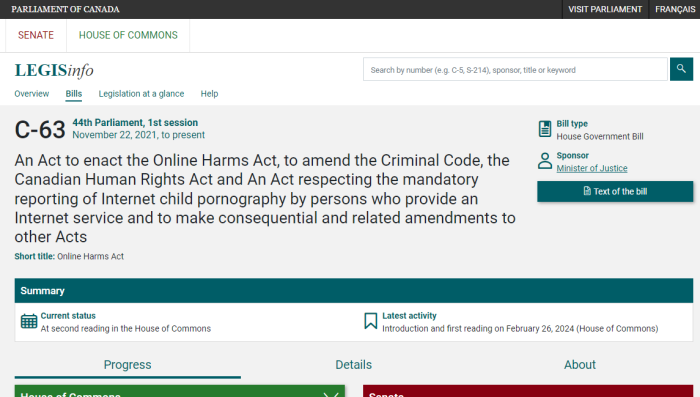
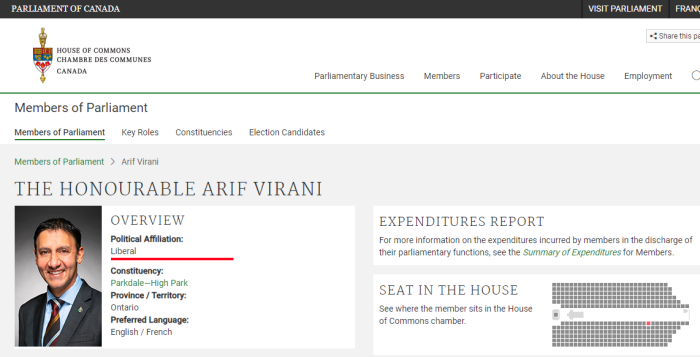
Bill C-63, the Online Harms Act, has been introduced in Parliament by Arif Virani, the Justice Minister. First Reading happened on February 26th, 2024. There’s a lot of it to go through
To begin with, there are actually some worthwhile provisions in the Bill, such as the mandatory reporting of child pornography. No sensible reason would reject that. And there are instances where being able to quickly remove certain content would be in the best interests of society.
Ottawa gives its own summary of the Bill.
However, Bill C-63 seems to blend together straightforward and legitimate issues with ones that are much more vague and impractical. Consequently, it’s harder to simply accept or reject.
There’s also the question of who has been influencing the drafting of this content. That will be addressed a bit later.
The Bill would create a Digital Safety Office of Canada, and an Ombudsman to oversee it. In essence, it would add a new layer of bureaucracy to specifically monitor “digital safety”.
Content that foments hatred is “defined” in this Bill, but is still vague. Additionally, it seeks to be able to attribute specific motivations to expression. What may be valid discourse to some will be considered hate speech to others.
There is a disclaimer that this wouldn’t apply to content solely because it expresses “disdain or dislike or it discredits, humiliates, hurts or offends”. Sounds great, but that also is subjective as well, depending on the views of whoever is interpreting it.
Harmful content in fact lists 7 different categories, and all of them at least somewhat open to interpretation. What can easily happen is that these new laws will be selectively applied, depending on the politics of the people involved.
The Bill would create a new section of the Criminal Code. This is one which a person could lay an information on another, and with the Attorney General’s consent, it could be brought before a Judge. If ordered by that Judge a person may be forced to enter into a recognizance, if a Judge is convinced that hate crime may be committed.
Fear of hate propaganda offence or hate crime
.
810.012 (1) A person may, with the Attorney General’s consent, lay an information before a provincial court judge if the person fears on reasonable grounds that another person will commit
(a) an offence under section 318 or any of subsections 319(1) to (2.1); or
(b) an offence under section 320.1001.
A person could be forced into this recognizance for up to 2 years, or would face 12 months in prison if they refuse. This is similar to being out on bail or on a peace bond, but with no actual crime committed.
Terms of the “recognizance” could include:
(a) Wearing an electronic monitoring device
(b) Return to and remain at their place of residence at specified times, a.k.a. a curfew
(c) Abstaining from drugs and alcohol
(d) Submitting to drug and alcohol testing
(e) No contact orders
(f) Weapons prohibitions
The topper on this one is that a Judge isn’t required to give reasons for this, but is supposed to say why written reasons aren’t included. Again, this is for when some is suspected that they may commit a crime. No actual charges are necessary.
Other changes to the Criminal Code involve Section 318 and 319, which raise the potential imprisonment for incitement to hatred from 2 years to 5 years.
Advocating genocide will also expose a person to a potential life sentence.
The Canadian Human Rights Act would also be amended to include “communication of hate speech”, which is defined as: to communicate or cause to be communicated hate speech by means of the Internet or any other means of telecommunication in a context in which the hate speech is likely to foment detestation or vilification of an individual or group of individuals on the basis of a prohibited ground of discrimination.
But it also is poorly defined, which will likely lead to it being applied in an uneven manner, depending on the politics of those involved.
Section 140 of the Online Harms Act is the “Regulations” part. This is where unnamed and unelected bureaucrats are able to change or interpret provisions of the legislation without any real oversight. Nearly all Acts have such a backdoor, which allows changes to be done behind the scenes.
There is more to Bill C-63, but those are some of the major points.
Now, where did this come from?
Lobbying is a reality in politics. Special interests groups lobby money to get certain agendas pushed, and to get money for their causes. This is hardly news. Searching the Federal Lobbyist Registry, the following names come up:
- Centre for Israel and Jewish Affairs (CIJA)
- National Council of Canadian Muslims (NCCM)
- Women’s Legal Education & Action Fund (LEAF)
- YWCA Canada
- Friends of Canadian Broadcasting
Are there others involved in this? Probably, but these are the names that come up, which appear to be relevant to regulating speech and expression.
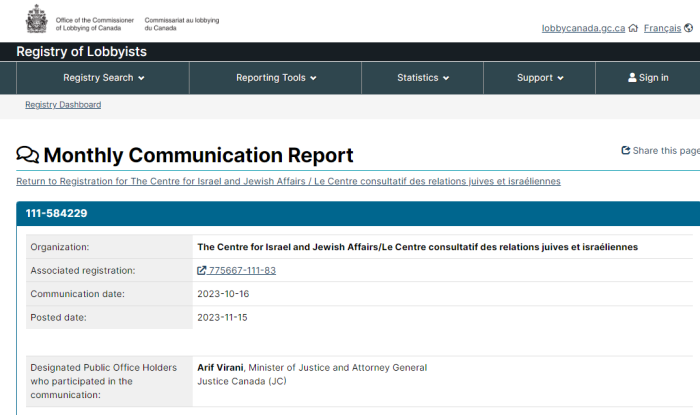
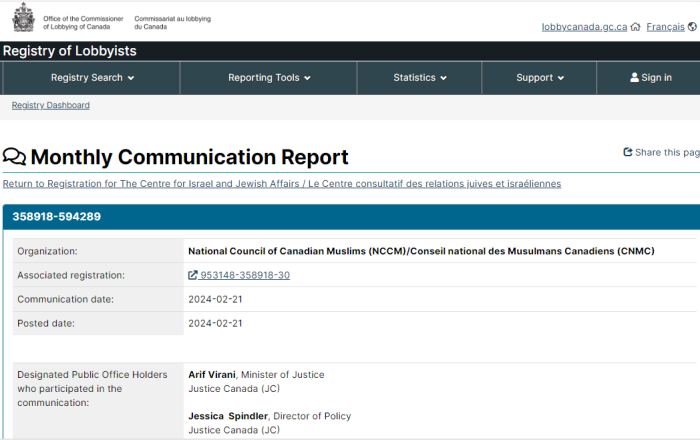
The Centre for Israel and Jewish Affairs, CIJA, has been prolific in lobbying Ottawa for changes to the Human Rights Act, and to the Criminal Code. This group has pushed for stricter definitions around so-called hate crimes and antisemitism. Their recent efforts include making Holocaust denial punishable by prison time, and removing religious protections. See here and here.
The National Council of Canadian Muslims, NCCM, specifically lists Section 13 of the Canadian Rights Act. They want laws against Islamophobia, and condemn “white supremacy”. Other efforts include anti-racism initiatives, such as Diversity, Equity and Inclusion.
Women’s Legal Education & Action Fund, LEAF, had pressured Ottawa to take action against online harassment and gendered violence. The recent lobbying specifically relates to new technologies used to do this.
YWCA Canada supports regulations against online hate, which is taken from a feminist and “gendered violence” perspective.
Friends of Canadian Broadcasting is a bit of an outlier. It wants more financial support for smaller, independent media, while opposing the funding of the CBC. It also pushes for regulations around online hate. Presumably, this would lead to many (much smaller) anti-racist outlets.
And to search online hate more generally, click on this link.
While it’s always important to read upcoming legislation, this piece often gets left out. The groups pushing for changes need to be considered as well. This is especially true if our interests don’t align.
(1) https://www.canada.ca/en/canadian-heritage/services/online-harms.html
(2) https://www.parl.ca/legisinfo/en/bill/44-1/c-63
(3) https://www.ourcommons.ca/Members/en/arif-virani(88910)
(4) https://www.parl.ca/DocumentViewer/en/44-1/bill/C-63/first-reading
(5) https://lobbycanada.gc.ca/app/secure/ocl/lrs/do/advSrch?searchCommand=navigate&time=1709098767406
(6) https://lobbycanada.gc.ca/app/secure/ocl/lrs/do/cmmLgPblcVw?comlogId=584229
(7) https://lobbycanada.gc.ca/app/secure/ocl/lrs/do/vwRg?cno=111®Id=937469
(8) https://lobbycanada.gc.ca/app/secure/ocl/lrs/do/cmmLgPblcVw?comlogId=594289
(9) https://lobbycanada.gc.ca/app/secure/ocl/lrs/do/vwRg?cno=358918®Id=946132
(10) https://lobbycanada.gc.ca/app/secure/ocl/lrs/do/vwRg?cno=362688®Id=941750
(11) https://lobbycanada.gc.ca/app/secure/ocl/lrs/do/vwRg?cno=377298®Id=947241
(12) https://lobbycanada.gc.ca/app/secure/ocl/lrs/do/vwRg?cno=375749®Id=944913
Private Member Bills In Current Session:
(A) Bill C-206: Decriminalizing Self Maiming To Avoid Military Service
(B) Bill C-207: Creating The “Right” To Affordable Housing
(C) Bill C-219: Creating Environmental Bill Of Rights
(D) Bill C-226: Creating A Strategy For Environmental Racism/Justice
(E) Bill C-229: Banning Symbols Of Hate, Without Defining Them
(F) Bill C-235: Building Of A Green Economy In The Prairies
(G) Bill C-245: Entrenching Climate Change Into Canada Infrastructure Bank
(H) Bill C-250: Imposing Prison Time For Holocaust Denial
(I) Bill C-261: Red Flag Laws For “Hate Speech”
(J) Bill C-293: Domestic Implementation Of Int’l Pandemic Treaty
(K) Bill C-312: Development Of National Renewable Energy Strategy
(L) Bill C-315: Amending CPPIB Act Over “Human, Labour, Environmental Rights”
(M) Bill C-367: Removing Religious Exemptions Protecting Against Antisemitism
(N) Bill S-215: Protecting Financial Stability Of Post-Secondary Institutions
(O) Bill S-243: Climate Related Finance Act, Banking Acts
(P) Bill S-248: Removing Final Consent For Euthanasia
(Q) Bill S-257: Protecting Political Belief Or Activity As Human Rights
Egale Canada – Their Own Words And Documentation
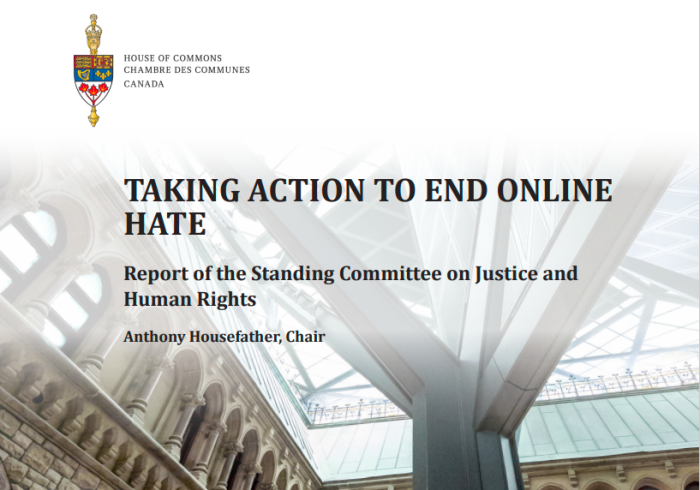
Egale Canada is a registered charity. Consequently, it’s heavily subsidized to carry out it’s activities, something that may not go over well with everyone. Are public funds being wisely spent?
Below is the source material for the video.
CHARITY DESIGNATION WITH C.R.A., TAX INFO:
(1) https://apps.cra-arc.gc.ca/ebci/hacc/srch/pub/dsplyRprtngPrd?q.srchNmFltr=egale+canada&q.stts=0007&selectedCharityBn=888561065RR0001&dsrdPg=1
(2) Egale 2006 Tax Information Redacted
(3) Egale 2007 Tax Information Redacted
(4) Egale 2008 Tax Information Redacted
(5) Egale 2009 Tax Information Redacted
(6) Egale 2010 Tax Information Redacted
(7) Egale 2011 Tax Information Redacted
(8) Egale 2012 Tax Information Redacted
(9) Egale 2013 Tax Information Redacted
(10) Egale 2014 Tax Information Redacted
(11) Egale 2015 Tax Information Redacted
(12) Egale 2016 Tax Information Redacted
(13) Egale 2017 Tax Information Redacted
(14) Egale 2018 Tax Information Redacted
(15) Egale 2019 Tax Information Redacted
(16) Egale 2020 Tax Information Redacted
(17) Egale 2021 Tax Information Redacted
(18) Egale 2022 Tax Information Redacted
PARLIAMENTARY TESTIMONY, BILL C-22: (Raising Age Of Consent From 14 To 16)
(1) https://www.ourcommons.ca/Committees/en/JUST/StudyActivity?studyActivityId=1736719
(2) https://www.ourcommons.ca/committees/en/WitnessMeetings?witnessId=107655
(3) https://www.ourcommons.ca/DocumentViewer/en/39-1/JUST/meeting-57/evidence
(4) https://www.ourcommons.ca/Content/Committee/391/JUST/Evidence/EV2805304/JUSTEV57-E.PDF
(5) Egale Canada Opposes Raising Age Of Consent
PARLIAMENTARY TESTIMONY, BILL C-75: (Reduced Penalties For Child Sex Crimes)
(1) https://www.ourcommons.ca/Committees/en/JUST/StudyActivity?studyActivityId=10210275
(2) https://www.ourcommons.ca/DocumentViewer/en/42-1/JUST/meeting-108/evidence
(3) https://www.parl.ca/DocumentViewer/en/42-1/bill/C-75/royal-assent
(4) https://parlvu.parl.gc.ca/Harmony/en/PowerBrowser/PowerBrowserV2/20180925/-1/30041?Language=English&Stream=Video
(5) Egale Canada Human Rights Trust Bill C-75
PARLIAMENTARY TESTIMONY, BILL C-6: (Conversion Therapy)
(1) https://www.ourcommons.ca/Committees/en/JUST/StudyActivity?studyActivityId=10980515
(2) https://egale.ca/newsletter-open-letter-c6/
(3) https://egale.ca/awareness/open-letter-bill-c6/?eType=EmailBlastContent&eId=cb124b36-46bf-4cab-b648-a3c75f571873
HIV NON-DISCLOSURE: (Hiding Positive Status From Partners)
(1) https://www.ourcommons.ca/Content/Committee/421/JUST/Brief/BR10044994/br-external/EgaleCanadaHumanRightsTrust-e.pdf
(2) https://www.ourcommons.ca/Committees/en/JUST/StudyActivity?studyActivityId=10485413
(3) https://www.ourcommons.ca/committees/en/WitnessMeetings?witnessId=248803
(4) https://www.ourcommons.ca/DocumentViewer/en/42-1/JUST/meeting-149/evidence
(5) https://www.ourcommons.ca/DocumentViewer/en/42-1/JUST/report-28/
(6) https://www.justice.gc.ca/eng/cons/hiv-vih/nd.html
(7) https://www.ourcommons.ca/DocumentViewer/en/42-1/JUST/report-28/page-24
ONLINE HATE: (Censorship)
(1) https://www.ourcommons.ca/Committees/en/JUST/StudyActivity?studyActivityId=10543157
(2) https://www.ourcommons.ca/Content/Committee/421/JUST/Reports/RP10581008/justrp29/justrp29-e.pdf
(3) https://www.ourcommons.ca/DocumentViewer/en/42-1/JUST/meeting-150/evidence#Int-10636774
(4) https://parlvu.parl.gc.ca/Harmony/en/PowerBrowser/PowerBrowserV2?fk=10625547
FEDERAL GRANTS TO EGALE:
(1) https://search.open.canada.ca/grants/record/esdc-edsc,141-2022-2023-Q2-28463,current
(2) https://search.open.canada.ca/grants/record/ic,230-2021-2022-Q4-021,current
(3) https://search.open.canada.ca/grants/record/hc-sc,271-2021-2022-Q4-00122,current
(4) https://search.open.canada.ca/grants/record/esdc-edsc,141-2023-2024-Q2-10753,current
(5) https://search.open.canada.ca/grants/record/pch,016-2022-2023-Q1-1347716,current
(6) https://search.open.canada.ca/grants/record/phac-aspc,1480-2022-2023-Qrt3-0000074,current
(7) https://search.open.canada.ca/grants/record/phac-aspc,1480-2022-2023-Qrt4-0000451,current
(8) https://search.open.canada.ca/grants/record/wage,001-2022-2023-Q4-00035,current
(9) https://search.open.canada.ca/grants/record/wage,001-2023-2024-Q3-00038,current
INTERFERING WITH LEGAL PROCEEDINGS:
(1) https://egale.ca/awareness/supreme-court-of-canada-decision-affirms-trans-rights-protective-counter-speech/
PARTNERS:
(1) https://egale.ca/our-partners/
POLICIES:
(1) https://egale.ca/wp-content/uploads/2022/10/Discriminatory-and-Unworkable-FINAs-Policy-1.pdf
(2) https://egale.ca/egale-in-action/msm-blood-ban/
RACHEL GILMORE TWEET:
(1) https://twitter.com/atRachelGilmore/status/1737207763640402361
At Least 13,748 Illegal Entries Into Canada In Q1 Of 2023
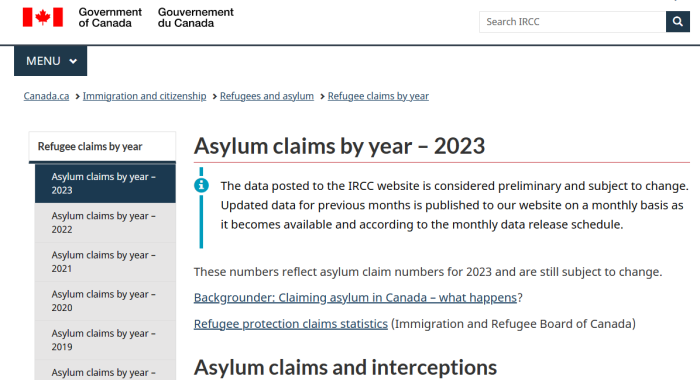
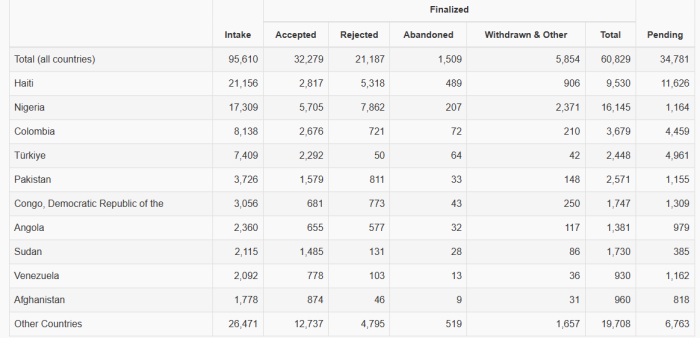
In the first quarter of 2023, nearly 14,000 people illegally entered Canada from the United States, claiming asylum. As with previous years, the overwhelming majority came through Roxham Road from New York State to Quebec.
Here are the official numbers thus far for 2023:
| YEAR: 2023 | |||||
|---|---|---|---|---|---|
| MONTH | QUEBEC | MANITOBA | B.C. | OTHERS | TOTAL |
| January | 4,875 | 19 | 100 | 0 | 4,994 |
| February | 4,517 | 5 | 59 | 0 | 4,581 |
| March | 4,087 | 15 | 71 | 0 | 4,173 |
| TOTAL | 13,479 | 39 | 230 | 0 | 13,748 |
Supposedly, Roxham Road was closed as a means of illegally entering Canada. Under the revised version of the Safe Third Country Agreement, there isn’t a loophole which allows people to circumvent the law simply by bypassing border checkpoints.
On March 24, 2023, Canada and the United States announced the expansion of the STCA across the entire land border, including internal waterways. The expansion takes effect as of 12:01 a.m. EDT on March 25, 2023. If you crossed the border to make an asylum (refugee) claim and don’t meet one of the Agreement’s exceptions, you’ll be returned to the U.S.
Of course, the new agreement calls for Canada to accept a minimum of 15,000 people (presumably extra), seeking asylum. Because…. why wouldn’t it?
We’ll have to see what comes of this.
As for where people have been coming from, data is available from 2017 through 2023.
For the last decade or so, these are the published numbers:
| PROVINCE/TERRITORY | 2011 | 2012 | 2013 | 2014 | 2015 | 2016 |
|---|---|---|---|---|---|---|
| Newfoundland | 0 | 0 | 0 | 0 | 0 | 0 |
| Prince Edward Island | 0 | 0 | 0 | 0 | 0 | 0 |
| Nova Scotia | 0 | 0 | 0 | 0 | 0 | 0 |
| New Brunswick | 10 | 5 | 5 | ? | ? | 25 |
| Quebec | 1,335 | 1,295 | 785 | 875 | 1,035 | 2,595 |
| Ontario | 2,660 | 2,340 | 1,995 | 2,630 | 2,790 | 3,7935 |
| Manitoba | 20 | 15 | 25 | 10 | 225 | 505 |
| Saskatchewan | ? | ? | ? | ? | ? | 30 |
| Alberta | 35 | 40 | 35 | 65 | 70 | 120 |
| British Columbia | 125 | 85 | 110 | 130 | 170 | 220 |
| Yukon | 0 | 0 | 0 | 0 | 0 | 5 |
| Northwest Territories | 0 | 0 | 0 | 0 | 0 | 0 |
| Nunavut | 0 | 0 | 0 | 0 | 0 | 0 |
| TOTALS | 4,185 | 3,770 | 2,955 | 3,715 | 4,290 | 7,365 |
Illegals were still coming into Canada via land border crossings during the Harper years. Interestingly though, it only receives major attention when Liberals are in power. A cynic may wonder why.
| YEAR: 2017 | |||||
|---|---|---|---|---|---|
| MONTH | QUEBEC | MANITOBA | B.C. | OTHERS | TOTAL |
| January | 245 | 19 | 46 | 5 | 315 |
| February | 452 | 142 | 84 | 0 | 678 |
| March | 654 | 170 | 71 | 2 | 897 |
| April | 672 | 146 | 32 | 9 | 859 |
| May | 576 | 106 | 60 | 0 | 742 |
| June | 781 | 63 | 39 | 1 | 884 |
| July | 2,996 | 87 | 51 | 0 | 3,314 |
| August | 5,530 | 80 | 102 | 0 | 5,712 |
| September | 1,720 | 78 | 79 | 4 | 1,881 |
| October | 1,755 | 67 | 68 | 8 | 1,890 |
| November | 1,539 | 38 | 46 | 0 | 1,623 |
| December | 1,916 | 22 | 40 | 0 | 1,978 |
| TOTAL | 18,836 | 1,018 | 718 | 22 | 20,593 |
| YEAR: 2018 | |||||
|---|---|---|---|---|---|
| MONTH | QUEBEC | MANITOBA | B.C. | OTHERS | TOTAL |
| January | 1,458 | 18 | 41 | 0 | 1,517 |
| February | 1,486 | 31 | 48 | 0 | 1,565 |
| March | 1,884 | 53 | 33 | 0 | 1,970 |
| April | 2,479 | 50 | 31 | 0 | 2,560 |
| May | 1,775 | 36 | 53 | 0 | 1,869 |
| June | 1,179 | 31 | 53 | 0 | 1,263 |
| July | 1,552 | 51 | 31 | 0 | 1,634 |
| August | 1,666 | 39 | 39 | 3 | 1,747 |
| September | 1,485 | 44 | 68 | 4 | 1,601 |
| October | 1,334 | 23 | 37 | 0 | 1,394 |
| November | 978 | 23 | 18 | 0 | 1,019 |
| December | 1,242 | 11 | 27 | 0 | 1,280 |
| TOTAL | 18,518 | 410 | 479 | 7 | 19,419 |
| YEAR: 2019 | |||||
|---|---|---|---|---|---|
| MONTH | QUEBEC | MANITOBA | B.C. | OTHERS | TOTAL |
| January | 871 | 1 | 16 | 1 | 888 |
| February | 800 | 1 | 6 | 2 | 808 |
| March | 967 | 13 | 22 | 0 | 1,002 |
| April | 1,206 | 15 | 25 | 0 | 1,246 |
| May | 1,149 | 27 | 20 | 0 | 1,196 |
| June | 1,536 | 26 | 5 | 0 | 1,567 |
| July | 1,835 | 23 | 15 | 1 | 1,874 |
| August | 1,712 | 26 | 22 | 2 | 1,762 |
| September | 1,706 | 19 | 17 | 0 | 1,737 |
| October | 1,595 | 18 | 8 | 1 | 1,622 |
| November | 1,118 | 9 | 21 | 0 | 1,148 |
| December | 1,646 | 2 | 5 | 2 | 1,653 |
| TOTAL | 16,136 | 180 | 182 | 9 | 16,503 |
| YEAR: 2020 | |||||
|---|---|---|---|---|---|
| MONTH | QUEBEC | MANITOBA | B.C. | OTHERS | TOTAL |
| January | 1,086 | 7 | 7 | 0 | 1,100 |
| February | 976 | 2 | 2 | 0 | 980 |
| March | 930 | 7 | 18 | 0 | 955 |
| April | 1 | 0 | 5 | 0 | 6 |
| May | 17 | 0 | 4 | 0 | 21 |
| June | 28 | 1 | 3 | 1 | 33 |
| July | 29 | 2 | 17 | 0 | 48 |
| August | 15 | 3 | 0 | 0 | 18 |
| September | 30 | 4 | 7 | 0 | 41 |
| October | 27 | 0 | 4 | 0 | 31 |
| November | 24 | 0 | 8 | 0 | 32 |
| December | 26 | 2 | 8 | 0 | 36 |
| TOTAL | 3,189 | 28 | 84 | 1 | 3,302 |
| YEAR: 2021 | |||||
|---|---|---|---|---|---|
| MONTH | QUEBEC | MANITOBA | B.C. | OTHERS | TOTAL |
| January | 28 | 1 | 10 | 0 | 39 |
| February | 39 | 0 | 1 | 0 | 40 |
| March | 29 | 5 | 2 | 0 | 36 |
| April | 29 | 2 | 2 | 0 | 33 |
| May | 12 | 3 | 13 | 0 | 28 |
| June | 11 | 0 | 6 | 0 | 17 |
| July | 28 | 5 | 6 | 0 | 39 |
| August | 63 | 2 | 11 | 0 | 76 |
| September | 150 | 0 | 19 | 0 | 169 |
| October | 96 | 0 | 17 | 0 | 113 |
| November | 832 | 1 | 12 | 0 | 845 |
| December | 2,778 | 0 | 33 | 0 | 2,811 |
| TOTAL | 4,095 | 19 | 132 | 0 | 4,246 |
| YEAR: 2022 | |||||
|---|---|---|---|---|---|
| MONTH | QUEBEC | MANITOBA | B.C. | OTHERS | TOTAL |
| January | 2,367 | 0 | 16 | 0 | 2,383 |
| February | 2,154 | 1 | 9 | 0 | 2,164 |
| March | 2,492 | 2 | 8 | 0 | 2,502 |
| April | 2,791 | 3 | 8 | 3 | 2,805 |
| May | 3,449 | 3 | 40 | 1 | 3,493 |
| June | 3,066 | 3 | 14 | 3 | 3,086 |
| July | 3,645 | 3 | 29 | 0 | 3,677 |
| August | 3,234 | 5 | 10 | 0 | 3,249 |
| September | 3,650 | 10 | 0 | 0 | 3,660 |
| October | 3,901 | 16 | 34 | 0 | 3,951 |
| November | 3,731 | 23 | 34 | 0 | 3,788 |
| December | 4,689 | 3 | 52 | 1 | 4,745 |
| TOTALS | 39,171 | 72 | 289 | 7 | 39,540 |
The numbers did drop considerably in 2020 through early 2022. This is probably done out of necessity in order to keep the “pandemic” narrative going. Letting people stroll in would have considerably undermined it.
And here are some other things to consider:
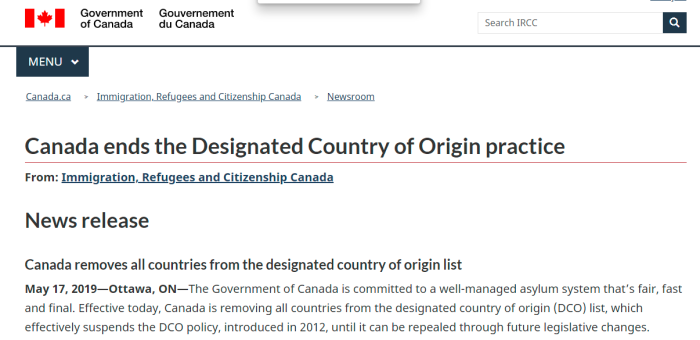
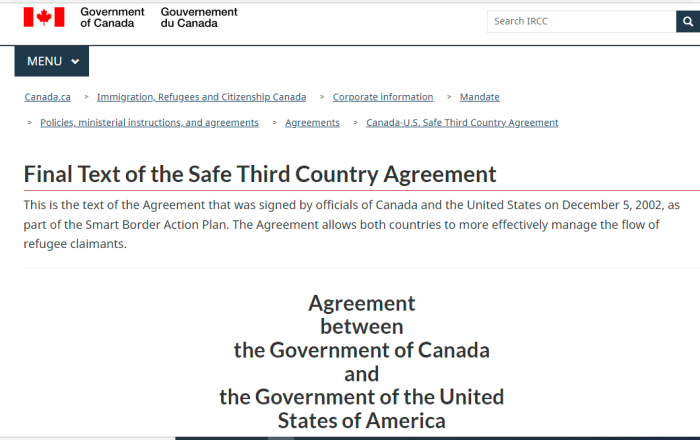
In 2019, something happened that wasn’t really reported on. It was that the Canadian Government scrapped the DCO, or Designated Country of Origin policy. This stopped people from 42 countries (mainly in Europe) from being able to abuse the refugee system with bogus claims.
The Parties agree to review this Agreement and its implementation. The first review shall take place not later than 12 months from the date of entry into force and shall be jointly conducted by representatives of each Party. The Parties shall invite the UNHCR to participate in this review. The Parties shall cooperate with UNHCR in the monitoring of this Agreement and seek input from non-governmental organizations.
As for the Safe 3rd Country Agreement, people are still allowed to enter, and it’s still being gamed by human smugglers and traffickers. Few people know this, but the Treaty is actually a 3-way arrangement with the UNHCR acting as a sort of facilitator. Now, this new version is supposed to prevent the kind of fraud that’s been going on, but who knows?
The U.N. High Commission on Refugees is a party to the Canada/U.S. border, at least as far as asylum claims are concerned. If both countries are considered “safe”, then why is this kind of shopping allowed?
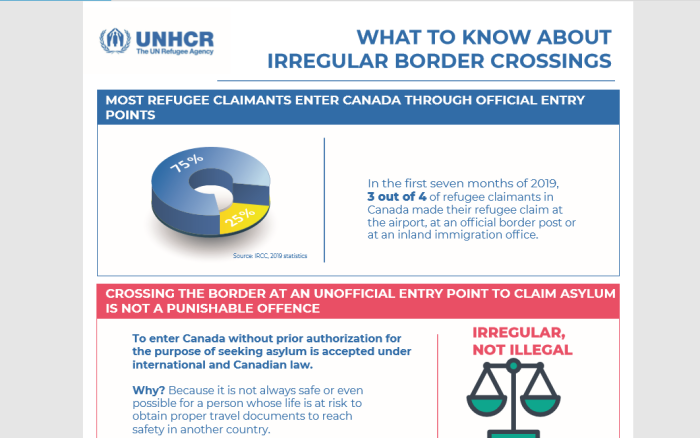
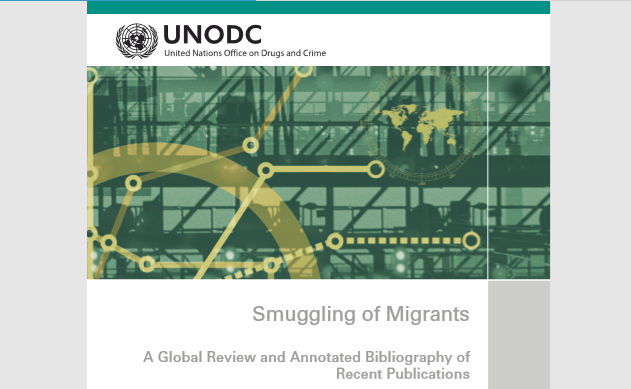
Not only is the United Nations a party to U.S/Canada border security, but the organization distributes information packages on how to circumvent the Safe Third Country Agreement. While claiming to care about the integrity of countries, they publish materials to do exactly the opposite.
Perhaps there will be an updated edition given changes to the STCA.
And no, this isn’t just well meaning naivety. The U.N. has extensively studied the connection between lack of border enforcement, and the facilitation of human smuggling and trafficking. It isn’t a surprise that open borders lead to increases in illegal crossings. They know exactly what’s going on.
This isn’t an issue of incompetence, but deliberate subversion.
(1) https://www.irb-cisr.gc.ca/en/statistics/Pages/irregular-border-crossers-countries.aspx
(2) https://www.canada.ca/en/immigration-refugees-citizenship/services/refugees/asylum-claims/processed-claims.html
(3) https://www.canada.ca/en/immigration-refugees-citizenship/services/refugees/asylum-claims/asylum-claims-2017.html
(4) https://www.canada.ca/en/immigration-refugees-citizenship/services/refugees/asylum-claims/asylum-claims-2018.html
(5) https://www.canada.ca/en/immigration-refugees-citizenship/services/refugees/asylum-claims/asylum-claims-2019.html
(6) https://www.canada.ca/en/immigration-refugees-citizenship/services/refugees/asylum-claims/asylum-claims-2020.html
(7) https://www.canada.ca/en/immigration-refugees-citizenship/services/refugees/asylum-claims/asylum-claims-2021.html
(8) https://www.canada.ca/en/immigration-refugees-citizenship/services/refugees/asylum-claims/asylum-claims-2022.html
(9) https://www.canada.ca/en/immigration-refugees-citizenship/services/refugees/asylum-claims/asylum-claims-2023.html
(10) https://www.canada.ca/en/immigration-refugees-citizenship/news/2019/05/canada-ends-the-designated-country-of-origin-practice.html
(11) https://www.canada.ca/en/immigration-refugees-citizenship/corporate/mandate/policies-operational-instructions-agreements/agreements/safe-third-country-agreement/final-text.html
(12) https://canucklaw.ca/tsce-10c-bit-of-history-doug-rob-ford-voted-in-2013-for-sanctuary-toronto-amnesty-for-illegals/
(13) https://www.canada.ca/en/immigration-refugees-citizenship/news/2019/05/canada-ends-the-designated-country-of-origin-practice.html
(14) https://www.canada.ca/en/immigration-refugees-citizenship/corporate/mandate/policies-operational-instructions-agreements/agreements/safe-third-country-agreement/final-text.html
(15) https://www.canada.ca/en/immigration-refugees-citizenship/corporate/mandate/policies-operational-instructions-agreements/agreements/safe-third-country-agreement.html
(16) UNHCR Information On Circumventing Border Security
(17) https://www.unodc.org/documents/human-trafficking/Migrant-Smuggling/Smuggling_of_Migrants_A_Global_Review.pdf
UNAIDS Releases Paper On “Human Rights-Based Approach” To Sexuality
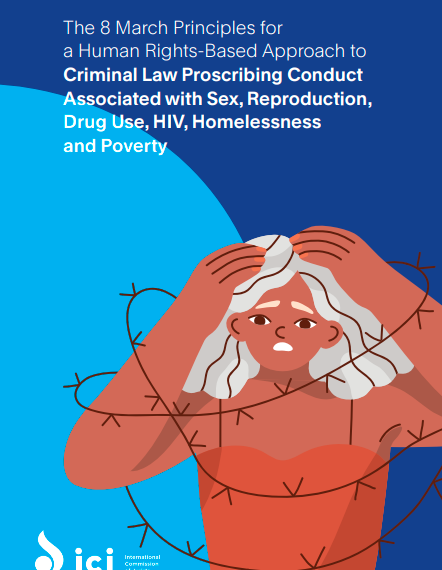
The Joint UN Programme on HIV/AIDS, UNAIDS, recently caused a stir. This policy paper came out: “The International Committee of Jurists (ICJ) along with UNAIDS and the Office of the High Commissioner for Human Rights (OHCHR) officially launched a new set of expert jurist legal principles to guide the application of international human rights law to criminal law.”
Sounds great, doesn’t it? Topics include:
- sexual and reproductive health and rights, including termination of pregnancy;
- consensual sexual activities, including in contexts such as sex outside marriage, same-sex sexual relations, adolescent sexual activity and sex work;
- gender identity and gender expression;
- HIV non-disclosure, exposure or transmission;
- drug use and the possession of drugs for personal use; and
- homelessness and poverty.
As with most things, the devil’s in the details.
To address the obvious: this is not legally binding on anyone. It’s just a paper. Still, that doesn’t mean the contents won’t work their way into Federal or Provincial legislation at some point.
As part of the Who We Are section, UNAIDS describes itself as “leading the global effort to end AIDS as a public health threat by 2030 as part of the Sustainable Development Goals.”

Apparently, UNAIDS timed this document to coincide with International Women’s Day. That’s interesting, to say the least.
Anyhow, this UNAIDS document is called the: “8 March Principles for a Human Rights-Based Approach to Criminal Law Proscribing Conduct Associated with Sex, Reproduction, Drug Use, HIV, Homelessness and Poverty”. (See archive).
In fairness, there could be a lot of poor and imprecise wording throughout the document. But assuming that there’s not, it’s quite disturbing what’s been put out.
Parts I and II cover more general areas and ideas in law, and often seem quite reasonable. Having laws applied equally and fairly to all is something most people can easily get behind. But Part III is where things change.
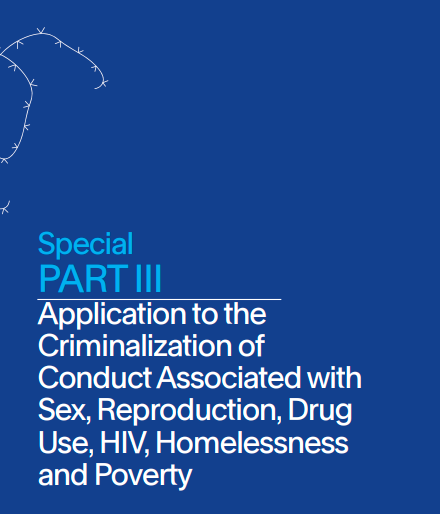
Part III (page 20) of the document is where things really get weird. The following comments are an accurate reflection of what’s actually being written.
(Principle 14, page 21) addresses “sexual and reproductive health and rights”. Apparently no one should be held accountable for a mother drinking or doing drugs while pregnant. Non-disclosure of HIV (or presumably any disease) isn’t to be considered illegal.
Moreover, where a person’s criminal actions might result in criminal consequences, there’s to be no extra punishments based on the existence of the pregnancy. An example of this would be the homicide of a pregnant woman leading to multiple murder charges.
Are the unborn babies expected to have any rights here?
(Page 22) there’s a provision where “parents, guardians, carers, or other persons” who enable or assist children in exercising their sexual and/or reproductive rights may not be held criminally liable. Is this sort of thing to justify pedophilia and grooming?
(Principle 15, page 22) suggests that there should be laws against abortion in any capacity whatsoever. This applies both to the mother, and any third party.
(Principle 16, page 22) covers “consensual” sexual activity. While this is premised on the idea that all participants are in agreement, the wording suggests that it could be applied to adults and children.
Consensual sexual conduct, irrespective of the type of sexual activity, the sex/gender, sexual orientation, gender identity or gender expression of the people involved or their marital status, may not be criminalized in any circumstances. Consensual same-sex, as well as consensual different-sex sexual relations, or consensual sexual relations with or between trans, non-binary and other gender-diverse people, or outside marriage – whether pre-marital or extramarital – may, therefore, never be criminalized.
With respect to the enforcement of criminal law, any prescribed minimum age of consent to sex must be applied in a non-discriminatory manner. Enforcement may not be linked to the sex/gender of participants or age of consent to marriage.
Moreover, sexual conduct involving persons below the domestically prescribed minimum age of consent to sex may be consensual in fact, if not in law. In this context, the enforcement of criminal law should reflect the rights and capacity of persons under 18 years of age to make decisions about engaging in consensual sexual conduct and their right to be heard in matters concerning them. Pursuant to their evolving capacities and progressive autonomy, persons under 18 years of age should participate in decisions affecting them, with due regard to their age, maturity
The prescribed minimum age of consent to sex must be applied in a non-discriminatory manner? What does that even mean? Is it discrimination if an adult is not allowed to be with a child?
The paper also states that minors should be participating in decisions that impact them, taking their age and maturity into account. Is this an attempt to turn a prohibited practice into more of a “grey area”?
As for “age of consent to marriage”, is that a reference to child brides?
There’s the issue of not criminalizing activity involving members of the alphabet soup. Just a thought, but since it’s okay to not disclose HIV status, would it also be okay to deceive a partner about their true identity?
(Principle 17, page 23) calls for the complete decriminalization of sex work — such as prostitution, or pornography — as long as it’s done without coercion or fraud. To their credit, it’s specified to be limited to adults.
(Principle 18, page 23) says that sexual orientation or gender identity should not be criminalized, but doesn’t define either term in a meaningful way.
Beyond that, there’s to be no penalty for “exploration, free development and/or affirmation of sexual orientation or gender identity”, unless coercion is involved. This leaves open the possibility of people just larping as the opposite sex, and who don’t have gender dysphoria.
It also doesn’t address the growing issue of using gender identity as a means to attack single-sex spaces, such as prisons, changerooms and most sports.
The document further criticizes any efforts or attempts to engage in conversion therapy.
(Principle 19, page 24) implies that it’s fine to not disclose HIV positive status to a partner, as long as there’s no deliberate attempt to spread it. Presumably, this wouldn’t just apply to HIV.
(Principle 20, page 24) effectively calls for the decriminalization of all drugs for personal use, including by minors and pregnant women. Part (b) could be interpreted to mean the possession or distribution or drug paraphernalia shouldn’t be criminalized either.
The document also promotes what could be considered safe injection sites.
(Principle 21, page 24) would end vagrancy and squatting laws, if done for life-sustaining reasons. While this is all understandable, it’s unclear what will happen with property owners. All said, this section is probably the most reasonable one, as it’s not an issue of immorality.
Now, just because the United Nations releases a document, that doesn’t mean it will become law. However, content from “non-binding” papers often do trickle into domestic politics.
(1) https://www.unaids.org/en/resources/presscentre/featurestories/2023/march/20230308_new-legal-principles-decriminalization
(2) https://www.unaids.org/en/whoweare/about
(3) https://icj2.wpenginepowered.com/wp-content/uploads/2023/03/8-MARCH-Principles-FINAL-printer-version-1-MARCH-2023.pdf
(4) UNAIDS March Principles On Criminal Law Sexual Behaviours

